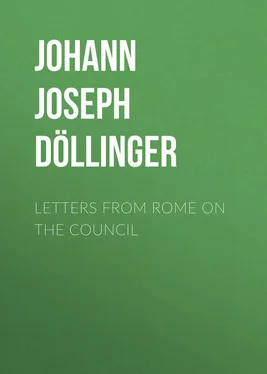Johann Döllinger - Letters From Rome on the Council
Здесь есть возможность читать онлайн «Johann Döllinger - Letters From Rome on the Council» — ознакомительный отрывок электронной книги совершенно бесплатно, а после прочтения отрывка купить полную версию. В некоторых случаях можно слушать аудио, скачать через торрент в формате fb2 и присутствует краткое содержание. Жанр: foreign_antique, foreign_prose, на английском языке. Описание произведения, (предисловие) а так же отзывы посетителей доступны на портале библиотеки ЛибКат.
- Название:Letters From Rome on the Council
- Автор:
- Жанр:
- Год:неизвестен
- ISBN:нет данных
- Рейтинг книги:3 / 5. Голосов: 1
-
Избранное:Добавить в избранное
- Отзывы:
-
Ваша оценка:
- 60
- 1
- 2
- 3
- 4
- 5
Letters From Rome on the Council: краткое содержание, описание и аннотация
Предлагаем к чтению аннотацию, описание, краткое содержание или предисловие (зависит от того, что написал сам автор книги «Letters From Rome on the Council»). Если вы не нашли необходимую информацию о книге — напишите в комментариях, мы постараемся отыскать её.
Letters From Rome on the Council — читать онлайн ознакомительный отрывок
Ниже представлен текст книги, разбитый по страницам. Система сохранения места последней прочитанной страницы, позволяет с удобством читать онлайн бесплатно книгу «Letters From Rome on the Council», без необходимости каждый раз заново искать на чём Вы остановились. Поставьте закладку, и сможете в любой момент перейти на страницу, на которой закончили чтение.
Интервал:
Закладка:
This is now their watchword. All the initiated repeat it, and some episcopal optimists try to persuade themselves and others that the danger is really past, and the scheme abandoned for this time. But the truth is this: the authorities know well enough that the absolutists among the Bishops – all those who hope to strengthen their dominion and extend it over secular matters by means of Papal Infallibility – are both numerous and organized, and only await the intimation that the right moment has arrived to come forward themselves with a motion powerfully supported. To begin with the Germans, there is the Bishop of Paderborn, whose Jesuit theologian, Roh, says that, precisely because Papal Infallibility is called in question by Bishops like Dupanloup and Maret, the Council must define it, to make any repetition of this atrocity impossible for the future. Then there are the Bishops of Regensburg, Würzburg, St. Pölten, and Gratz, the Belgian and English Prelates, and those of French Switzerland, among whom Mermillod rivals Manning in his fanatical zeal for the new dogma; the Spanish Prelates – men selected for promotion by Queen Isabella and the nuncio at Madrid, simply for their thorough-paced ultramontanism – pure absolutists in Church and State, who would gladly see the new dogma ready-made at once, but have to be restrained for a while. To these must be added such French Prelates as Plantier of Nîmes, Pie of Poitiers, the Bishops of Laval and Montauban, and others. One knows least of the votes of the Italian and United States Bishops, who, like the Irish, will probably be divided. In any case the Court party can count on a considerable majority in favour of the new dogma.
Of course the opposite party, who wish to stave it off, is strong and numerous. To it belong the majority of the German and Austrian, as well as the Bohemian and Hungarian Prelates, and among the French, the Archbishops of Paris, Rheims, and Avignon, the Bishops of Marseilles, Grenoble, Orleans, Chalons, and many more. And on the point of the time being inopportune for defining the Infallibilist dogma, a portion of the “old Papal guard,” – viz., the Italian Bishops – will join them, not to speak of American and Irish Prelates.
But – and in this lies their weakness – they are only held together by a very loose bond. The one point they are agreed upon is that the promulgation of the new dogma will cause great embarrassments to the Church and to themselves personally, and involve them in all sorts of conflicts. On the main question, whether this substitution of an infallible man for an infallible Church is true, and attested by Scripture and Tradition, they are themselves divided. If the confidants of the Curia understand how to insert the wedge into this split, and drive it home, they may perhaps contrive to break up the whole Opposition, and carry through, by an imposing and apparently almost unanimous vote, this Alpha and Omega of ultramontanism, in which all their wishes and hopes are concentrated. Meanwhile no stone will be left unturned, and very various methods will be applied, and arguments used, in working upon different Bishops. The earnest desire of the Holy Father will be urged on some soft-hearted Prelates; they will be told that the only way the Council can rejoice his heart amid his bitter trials, and brighten the evening of his life, is by freely offering him that crown of personal infallibility which former Popes have striven for, but never obtained. To others it will be intimated that the Council itself must look like a play with the chief figure left out, or an abortion, if the Syllabus and Infallibility are not made into dogmas, for there is no other question important enough to justify collecting 500 Bishops from five quarters of the world. Those who agree with the doctrine, but shrink for the present from the unpleasant consequences it might entail upon them, will be told, “Now, or perhaps never.” With freedom of the press established everywhere, it will be impossible much longer to keep the poison of historical criticism, so especially rife in Germany, out of the theological schools and seminaries, and so perhaps the next generation of clergy will not believe so absolutely in Papal Infallibility as the clergy in many countries do now, and then the new dogma will come at an unseasonable time, and encounter powerful opposition. Besides, it is best to lose no time in putting the iron bar of the new dogma across the way, for then all historical facts that witness against Infallibility, all results of criticism and investigation, all appeals to the forgeries and fictions which helped to build up the edifice, are once for all got rid of and destroyed, at least within the Church. No Catholic will any longer venture to appeal to them, and if he is an historical student, he will only be able to console himself by saying, Credo, quia absurdum . The dogma has triumphed over history, as Manning has so admirably explained in his last Pastoral.
Their favourite argument is the common one about increasing the strength and security of the coercive power of the Church. The Bishops are told that the personal infallibility of the Pope will make not only him but them, his delegates and plenipotentiaries, much more powerful, and that under its shadow they will rule with a stronger hand, for resistance will, in most cases, be blasphemy against the Holy Ghost, speaking through the Pope and his chosen instruments. Who, for instance, would any longer dare to defend a book condemned by the Congregation of the Index, after it had become infallible? On the other hand, the Bishops have their scruples, and some of them may be heard saying that this would be a poor consolation for losing half their episcopal authority, and that it is hard to ask them to degrade themselves, and renounce their former dignity as the supreme tribunal of faith, by making the Pope infallible. It might not be pleasant to return home from the Council with the consciousness of having themselves abdicated at Rome the best, and what has hitherto been held in the Church the highest, part of their authority, and burned it as a holocaust on the altar of Papal autocracy. The rôle of a Papal courtier, however convenient at Rome, has its dark side north of the Alps.
Already many symptoms of uneasiness betray themselves. Pius ix. said the other day to a German Prince of the Church, who formerly gave his opinion against the Immaculate Conception, and has now again pronounced openly against the Infallibilist dogma, Ce dogme de l'infaillibilité passera, comme l'autre, malgré vous . On the other hand, the Regolamento has excited great discontent, for it unmistakeably indicates the design of giving the Pope the decision, and making the Bishops only consultors. Had the assembly been in some degree prepared for it, and had time allowed them for coming to an understanding, there would certainly have been opposition to it. But the heads of the French episcopate have only just come together, and no attempt even has been made to bring the German and French Bishops into communication with each other. And a feature of Roman policy about the Council, now first introduced, is not exactly calculated to promote confidence and a happy expectation of the prosperous results of the Synod. I mean the rigid secrecy. According to the last directions, all, bishops and theologians, are to maintain the strictest secrecy about everything, and the preliminary labours, as is well known, had to be carried on under the seal of secrecy of the Holy Office (the Inquisition). Nothing was communicated to the Bishops themselves, who came to Rome in complete ignorance of what they were to vote about – a procedure without any precedent in Church history. It really seems sometimes as if the object was to turn the Church topsy-turvy, and take pleasure in doing exactly the contrary to what the Church of earlier ages did when nearer her original foundation. Formerly the idea of a Council was associated with the notion of the fullest publicity, and the common participation of all the faithful; the deliberations were conducted with open doors, and all were admitted who wished to hear them, – for from the beginning all secrecy was strange and unnatural to the Church, which was distinguished from heathenism in the very point of neither having nor tolerating any esoteric doctrine or secret compact. But the Roman prelatura too shares the Italian predilection for making mysteries, – as evidenced in the number of secret societies in the Peninsula, – and then the Jesuits of the Civiltà , and their French and German copyists, had so solemnly promised that the Council would provide in its decrees a sure and effective remedy for humanity, sorely diseased as it is, and threatened with destruction. As yet we have waited in vain for any intelligible intimation of what this panacea is to be. Beyond Papal Infallibility and the Syllabus, nothing has transpired. Were the curtain to be drawn back at the beginning, and the secret betrayed, – that the much lauded panacea is only moonshine, and that the Council is not in a position to prescribe any other medicine to the patient named mankind than the usual and well-known remedies of faith, hope, and charity – the discord, already growing, would be still further increased. It is well therefore to lay the finger on the lips.
Читать дальшеИнтервал:
Закладка:
Похожие книги на «Letters From Rome on the Council»
Представляем Вашему вниманию похожие книги на «Letters From Rome on the Council» списком для выбора. Мы отобрали схожую по названию и смыслу литературу в надежде предоставить читателям больше вариантов отыскать новые, интересные, ещё непрочитанные произведения.
Обсуждение, отзывы о книге «Letters From Rome on the Council» и просто собственные мнения читателей. Оставьте ваши комментарии, напишите, что Вы думаете о произведении, его смысле или главных героях. Укажите что конкретно понравилось, а что нет, и почему Вы так считаете.












